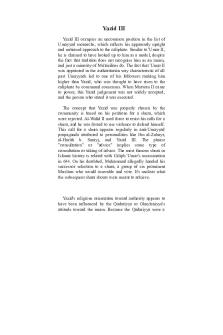Yazid III - Lecture notes 1 PDF

| Title | Yazid III - Lecture notes 1 |
|---|---|
| Course | The Umayyads |
| Institution | Jamia Millia Islamia |
| Pages | 3 |
| File Size | 57 KB |
| File Type | |
| Total Downloads | 101 |
| Total Views | 129 |
Summary
Yazid III occupies an uncommon position in the list of Umayyad monarchs, which reflects his apparently upright and unbiased approach to the caliphate. Similar to 'Umar II, he is claimed to have looked up to him as a model, despite the fact that tradition does not recognise him as an imam, and just a...
Description
Yazid III Yazid III occupies an uncommon position in the list of Umayyad monarchs, which reflects his apparently upright and unbiased approach to the caliphate. Similar to 'Umar II, he is claimed to have looked up to him as a model, despite the fact that tradition does not recognise him as an imam, and just a minority of Mu'tazilites do. The fact that 'Umar II was appointed in the authoritarian way characteristic of all past Umayyads led to one of his followers ranking him higher than Yazid, who was thought to have risen to the caliphate by communal consensus. When Marwan II came to power, this Yazid judgement was not widely accepted, and the person who stated it was executed. The concept that Yazid was properly chosen by the community is based on his petitions for a shura, which were rejected. Al-Walid II used force to resist his calls for a shura, and he was forced to use violence to defend himself. This call for a shura appears regularly in anti-Umayyad propaganda attributed to personalities like Ibn al-Zubayr, al-Harith b. Surayj, and Yazid III. The phrase "consultation" or "advice" implies some type of consultation or taking of advice. The most famous shura in Islamic history is related with Caliph 'Umar's assassination in 644. On his deathbed, Muhammad allegedly handed his successor selection to a shura, a group of six prominent Muslims who would assemble and vote. It's unclear what the subsequent shura shouts were meant to achieve.
Yazid's religious orientation toward authority appears to have been influenced by the Qadariyya or Ghaylaniyya's attitude toward the imam. Because the Qadariyya were a
precursor to the later Mu'tazilite theological movement, it is likely that they recognised him as an imam. At the time of his ascension in Damascus, Yazid is said to have delivered an introductory khutba in which he pledged to avoid numerous abuses of power, tacitly assigning them to his predecessors, and concluded by promising his subjects the right to overthrow him if he failed to keep his vows. Also, if they wanted to pledge allegiance to someone more qualified, Yazid swore to be the first to do so and obey their directives. In defiance of God, one should not obey a man; entire obedience is given solely to God. This speech is linked to the Ghaylaniyya's programme, which argues that the imam can come from any family, Arab or non-Arab, and that he should be appointed only based on his devotion and acceptance of the Koran and Sunna.
The list of injustices Yazid pledged not to perpetrate may provide some insight into the complaints levelled against the Umayyads. A reduction in building and irrigation projects, perhaps a response to public discontent with the expansion of private estates like Hisham and Khalid alQasri's; a commitment to spend revenues raised only in that territory, perhaps a response to provincial discontent with the drain of resources to Syria; a promise not to keep soldiers away from remote areas for long periods, something that appears to have triggered a military revolt. Except for this pronouncement, Yazid's caliphate is noted for its considerable swing in favour of Yemen, which was important in bringing him to power. He replaced Yusuf b. 'Umar al-Thaqafi as governor of Iraq with Mansur b. Jumhur, the Kalbi tribal head. En Iraq, he had failed to
persuade the Qaysis to oppose the new governor. He was eventually captured in hiding near the Jordanian border and transported to a prison in Damascus. Despite Mansur b. Jumhur's selection of his own brother as Khurasan's governor, Nasr b. Sayyar refused to resign and was ultimately saved by events. After just two months, Yazid replaced Mansur b. Jumhur as governor of Iraq with 'Abd Allah b. 'Umar, a son of 'Umar II and a royal family member. We can only surmise, but it is probable that the devoted opposition has had more influence over the new caliph. Yazid died four months later, after only six months on the throne (September 744)....
Similar Free PDFs

Yazid III - Lecture notes 1
- 3 Pages

Programacao III - Lecture notes 1
- 216 Pages

TEMA III - Lecture notes 3
- 18 Pages

Lecture notes, lecture 1
- 9 Pages

Lecture notes, lecture 1
- 4 Pages

Lecture-1-notes - lecture
- 1 Pages

Lecture notes- Lecture 1
- 20 Pages

Lecture notes, lecture 1
- 4 Pages

Lecture-1 - Lecture notes 1
- 6 Pages

Lecture notes, lecture 1
- 9 Pages

Calc III Complete - Lecture notes All
- 288 Pages

OFRM III Topic 2-1 - Lecture notes 2
- 43 Pages
Popular Institutions
- Tinajero National High School - Annex
- Politeknik Caltex Riau
- Yokohama City University
- SGT University
- University of Al-Qadisiyah
- Divine Word College of Vigan
- Techniek College Rotterdam
- Universidade de Santiago
- Universiti Teknologi MARA Cawangan Johor Kampus Pasir Gudang
- Poltekkes Kemenkes Yogyakarta
- Baguio City National High School
- Colegio san marcos
- preparatoria uno
- Centro de Bachillerato Tecnológico Industrial y de Servicios No. 107
- Dalian Maritime University
- Quang Trung Secondary School
- Colegio Tecnológico en Informática
- Corporación Regional de Educación Superior
- Grupo CEDVA
- Dar Al Uloom University
- Centro de Estudios Preuniversitarios de la Universidad Nacional de Ingeniería
- 上智大学
- Aakash International School, Nuna Majara
- San Felipe Neri Catholic School
- Kang Chiao International School - New Taipei City
- Misamis Occidental National High School
- Institución Educativa Escuela Normal Juan Ladrilleros
- Kolehiyo ng Pantukan
- Batanes State College
- Instituto Continental
- Sekolah Menengah Kejuruan Kesehatan Kaltara (Tarakan)
- Colegio de La Inmaculada Concepcion - Cebu



